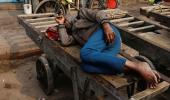American President Donald Trump has announced imposing reciprocal tariffs on its major trading partners including China that levy higher import duties on goods shipped from the United States.

He has already announced a 25 per cent duty on steel and aluminium imports, which will come into effect from March 12.
While announcing the new tariff policy, the president has also spoken about how India is "right at the top of the pack" when it comes to tariffs.
With all these countries being members of the global trade body World Trade Organisation (WTO), the decisions of the US may challenge the WTO principles.
A list of Q & As (questions and answers) to explain the wider implications of the US move:
What is WTO?
The 166-member Geneva-based WTO is a multilateral body which formulates rules for global trade and adjudicates disputes between the countries.
Its main objective is to promote smooth, predictable and free flow of goods.
Both India and the US have been members since 1995.
The nations have signed multiple agreements governing trade in goods, services, and intellectual property.
These pacts set rules and guidelines for international trade.
What are tariff commitments under WTO?
One of the key principles of the WTO is tariff binding, which ensures predictability and stability in global trade.
Bound tariffs are the maximum tariff rates that a WTO member commits to under its Schedule of Concessions.
These commitments are legally binding, meaning a country cannot impose tariffs above this level without renegotiation.
Applied tariffs are the actual tariff rates a country levies on imports.
These can be lower than the bound rate but cannot exceed it without violating WTO rules.
What if a country imposes higher tariffs than the bound duties?
If a member country imposes a tariff higher than its bound commitment, it violates Article II of GATT (General Agreement on Tariffs and Trade) 1994, which says that members must not impose duties or charges exceeding those listed in their schedules and they cannot impose any other duties or charges that are not specified in their schedules.
Affected countries can file a complaint with the WTO Dispute Settlement Body (DSB) against high duties.
The first step to resolve the dispute under DSB rules are bilateral consultations.
If consultations fail, the complainant country may be allowed to impose retaliatory tariffs or other trade countermeasures after receiving approval from the WTO.
Can a WTO member increase its bound tariff rates?
Yes. But only by negotiating that with affected countries under GATT Article XXVIII (Modification of Schedules), where it must offer compensatory concessions or by invoking emergency provisions like safeguards, or national security exceptions in specific cases.
The US under the previous Trump regime, had introduced additional tariffs of 25 per cent on steel and 10 per cent on aluminium products, on grounds of 'national security' under section 232 of its Trade Act.
It had cited threats to domestic steel production capacity. However, the WTO has ruled against this measure in multiple cases.
India had also imposed retaliatory duties on 28 American goods.
The Global Trade Research Initiative (GTRI) said that the WTO dispute panel stated that national security exceptions cannot be used arbitrarily and must be linked to real security concerns during war or emergencies.
What did the US do in response?
According to the GTRI, America refused to comply with the WTO ruling, arguing that it has the sovereign right to determine its national security policies. It has also blocked the WTO Appellate Body, preventing an appeal resolution.
Why countries like India have high import duties and developed countries like the US have low tariffs?
Developing countries like India maintain high import duties primarily to protect domestic industries, generate revenue, and support economic development.
These nations often rely on tariffs to shield their emerging sectors from foreign competition, promote self-sufficiency, and manage trade imbalances.
On the other hand, developed countries like the US have lower tariffs because their industries are already globally competitive, and they benefit from open markets that allow their businesses to access foreign consumers with minimal trade barriers.
Historically, according to the GTRI, when the WTO was established in 1995, developed nations agreed to let developing countries retain higher tariffs in exchange for commitments on Trade-Related Aspects of Intellectual Property Rights (TRIPS), services trade liberalization, and agricultural rules that primarily favoured wealthier nations.
What is the special and differential treatment under WTO?
The WTO agreements contain special provisions which give developing countries special rights and allow other members to treat them more favourably.
For example, developing countries like India can take more time to reduce its tariffs and export subsidies than more rich nations.
Does India have a right to fight the 25 per cent tariffs on steel and aluminium and the threat of reciprocal tariffs at the WTO?
Yes, according to RV Anuradha, Partner, Clarus Law Associates.
Will India initiate a dispute in the WTO against the duties on steel and aluminum?
Anuradha said given the current negotiations between India and US governments towards a trade deal, it is practically "unlikely" that India would want a protracted fight at the WTO.
"But my advice would be to not expect a bilateral deal to work magic and be firm on what will be truly beneficial for us.
"At a minimum, pending the conclusion of bilateral trade negotiations, there should be suspension of the enhanced steel and aluminum tariffs, and the reciprocal tariffs. If we do not get this, then we need to seriously consider retaliatory tariffs, and also keep the option of a WTO dispute open," she said.
What should India do?
Anuradha suggested that India needs to work with other WTO members towards ensuring the continued relevance of the organisation - which is increasingly beleaguered due to lack of an enforceable dispute resolution mechanism.
"There is absolutely no substitute for an effective rules based multilateral order where we have the strength of shared interests of developing countries.
"Bilateral deals will only be an enhanced power-play," she added.











 © 2025
© 2025